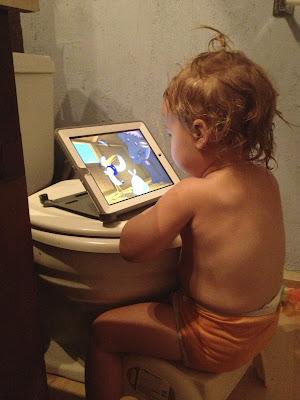She Drinks Her Tech With Mother's Milk
 |
| After a bath, my daughter set the iPad up and dragged her stool to the potty, which she used as a table, while I brushed my teeth beside her. |
The first thing my daughter liked to look at was my face. As a tiny baby, I'd hold her, and she'd lock her beautiful eyes on mine. When she started being able to smile, she'd smile at me. She'd look up at me while she nursed, keeping her eyes always on mine.
While I was on maternity leave and spending much of my time sitting in a rocking chair nursing her, I'd gaze back much of the time, but I'd also watch movies on my laptop, read books in the Kindle app on my phone, or scroll through Facebook on my phone. As she became more and more cognizant of the world outside my eyes, one of the first things she noticed was the iPhone.
She learned to play with it early, and not long after she could hold items with her own hands, she had her own apps that she could find and manipulate. Well before her first birthday, she was operating an iPhone like a pro. She literally drank in technology with her mother's milk.
She'll be 2 this weekend, and she still nurses a little. She'll ask me to hold the iPad for her so she can play with her puzzles or watch PBS Kids clips while nursing.
I was recently reading a UX Mag article about common mistakes UX teams make, and one of them mentioned "Designing for the Wrong Generation." Here's a quote:
The afternoon after I read this article, I spoke with a girlfriend who is a parent to a teenage boy. She's a Baby Boomer, and her kid a millennial. They'd been having an argument via text message, and she'd felt truly constrained by the medium in being able to convey her thoughts and empathize with her son. Her son couldn't understand what was wrong. I thought of the article I'd read while talking to her, and later mentioned to her that the generational expectations around technology are very different. Even though they are both on iPhones, her son expects that his text conversation is just as clear and effective as a face-to-face or phone conversation would be. To his mom, however, it's severely limiting.Research shows that there are generational differences in the expectations and mental models that people have about technology. The technology that is dominant when you are between the ages of eight and 10 forever changes the way you think about technology. So if you design a website with content, features, and interactions that you think work well, it’s likely that it won’t be so great for people who are in another generational group.For example, Baby Boomers expect technology to help them get stuff done. They don’t demand a multi-channel experience, and they make a distinction between different channels: TV is one channel and “the Internet” is another.Generation Xers expect some technology to help them get stuff done and other technology to be fun to play with. Gen Xers think that it’s important to be able to customize and personalize an interface and an interaction, an idea that is not that important to other generations.Millennials don’t even think about the term “technology.” Everything is technology. They think in terms of what they are doing, not what the technology is doing. Boomers will say, “Go look that up on the Internet.” Millennials would just say, “Go look it up.”
I thought of my own daughter, who is weaning off the breast and onto more and more technology. As a Generation Xer who works in UX, I'm pretty tech-savvy; however, I still believe that my technology is a marvel. My iPhone is a wonderful device, but it doesn't feel like a part of myself. I expect it to make my life easier and more convenient, but I don't expect to have full, meaningful conversations via text message (except for the occasional marital spat, but that's a different post).
I wonder what the generation gap will look like in 15 years, when my daughter and I fighting about her curfew via Google Glass or whatever gadgets we've gotten implanted into our brains. Will I think it's super disrespectful that she's trying to beam her angsty teenage thoughts to me? Will she be unable to understand why I want to look at her face instead of a 3-dimensional video of her experience?
Weird stuff.

Comments
Post a Comment